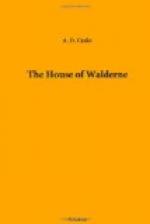And so, with an eloquence unsurpassed in the experience of his hearers, he drew all hearts to the Incarnate Love who wept, bled, died for them, and bade them see that Passion pictured in the Holy Mysteries, which were about to be celebrated before them, and to give Him their hearts’ oblation in union with the sacrifice.
After the service the noon meat was spread in the castle hall, and afterwards Martin was invited to a private conference with the Lady Sybil. She received her nephew, as she already suspected him to be, in a little chamber of the tower long since pulled down. The scent of honeysuckle was borne in on the summer night air, and the rays of a full moon shone brightly through an open casement. At first the conversation was confined to the topic of Martin’s discourse, which we here omit, but afterwards the dame said:
“My child, for thou art but a child in years to me, tell me why it is thy voice seems so familiar, and even the lineaments of thy countenance?”
Martin was embarrassed and silent. He did not wish just now to reveal the secret of his relationship.
“Tell me,” said she, “doth thy mother yet live?”
“She doth.”
“And proud must she be of her son.”
He was still silent.
“Brother Martin,” said she, “I had a sister once, a wilful capricious girl, but of a loving heart. We lost her early. She did not die, but yet died to her family. She ran away and married an outlaw chieftain. Our father said, leave her to the life she has chosen, and forbade all communication: but often has my heart yearned for my only sister.”
She continued after a long pause:
“I heard that her husband, for whom she left us, died of wounds received in a foray, and that she actually married his successor, a man of low degree. That by her first husband, who was said to be of noble English blood, she had one child, a son.”
Again a long pause:
“And since I have been told that that son has reappeared, a brother of Saint Francis. The report has spread all through these parts. Tell me, is it true?”
Martin saw that all was known, and concealed himself no longer.
“It is true, aunt,” he said.
She embraced him, while the tears streamed down her cheeks.
“Oh, my Martin: Hubert is no more: and thou shouldst have been Lord of Walderne.”
“I seek a better inheritance, and I have not lost my hope of Hubert’s return.”
“I shall never see him, and I cannot trust Drogo, although he be the nephew of my late dear lord. I fear he will make a bad Lord of Walderne.”
“Then, my lady, leave the place simply in trust for Hubert, in case ought happen to you. Again I say Hubert will return.”
“What Drogo takes charge of, he will keep.”
“Then confer with the neighbouring gentry, with Earl Warrenne and others, and ask their advice how to secure the property for the true heir.”




